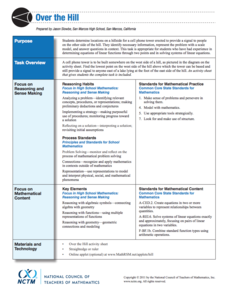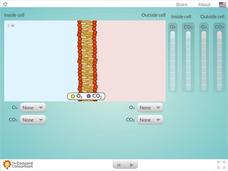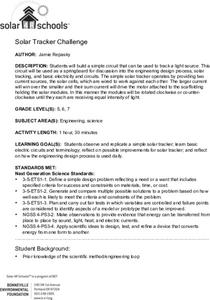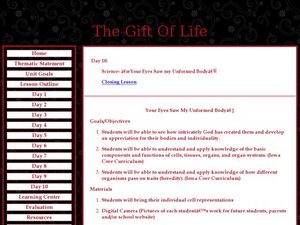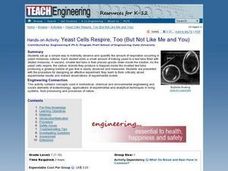Howard Hughes Medical Institute
The p53 Gene and Cancer
Is understanding the p53 gene the key to kicking cancer? Introduce a most-important protein through a presentation with colorful diagrams, simulations, and brief lectures. Viewers discover how p53 works, the cellular processes it...
Bonneville
Variables Affecting Solar Power
Determine the best energy generator. Groups play with a photovoltaic cell to determine the variables that affect its energy output. The teams investigate a variable to determine the optimum performance of the solar cell. Pupils compare...
Curated OER
Science Jeopardy
Wow! Review an entire semester of biology curriculum playing this Science Jeopardy game! The variety of topics is extremely broad, so you will need to review each question to find if they all apply to your course. As you find material...
National Council of Teachers of Mathematics
Over the Hill
Can you hear me from there? Pupils determine the place to build a cell tower on a hill. The class uses constraints and creates a scale drawing on a coordinate system to calculate the exact location of the base of the cell tower.
Utah Education Network (UEN)
Utah Open Textbook: 7th Grade Science
Physical and biological factors affect everyday living. Scholars explore electromagnetic forces, motion, the rock cycle, and geological changes. They examine cells as the building blocks of life and how organisms reproduce using images...
Bonneville
Introduction to the Photovoltaic Effect
Let a video light the way to a better understanding of solar energy. Scholars first learn vocabulary terms related to the photovoltaic effect, solar cells, and electricity. They then watch a video to learn why silicon is often used as a...
Bonneville
Simple Solar Tracker
Let the solar cells fight each other for supremacy! Given a functional solar tracker that moves toward light, groups copy the design to build their own devices. They use two sets of solar cells that have reverse polarization, so that the...
Exploratorium
Penny Battery
Use pennies to light an LED. Class members follow the provided directions to build a multi-celled battery powered by pennies. Using stacks of pennies of varying heights, pupils control the voltage of the battery to light...
Concord Consortium
Diffusion Across a Permeable Membrane
Oxygen and carbon dioxide freely cross cell membranes. The simulation demonstrates the diffusion of these across a permeable membrane. To create a great visual for users, it graphs the balance of molecules as it changes throughout the...
Nuffield Foundation
Making Up Nutrient Agars
A resource rich in information—and nutrients. Learners create agars for the purpose of cell cultivation in Petri dishes. The lesson provides instructions on how to create agars for the cultivation of different microorganisms.
College Board
2018 AP® Biology Free-Response Questions
The average AP Biology score dropped in 2018 with the addition of more data tables and graphs. Offer additional practice free-response questions by using the questions from the 2018 AP exam covering phylogenetic trees, cell structure and...
Children’s Hospital of Philadelphia
The Adaptive Immune System
Attack the pathogen from within. Learners delve deeper into the immune system and find out about the adaptive immune system such as T and B cells. Groups create graphical models of the adaptive immune system along with a multimedia...
Bonneville
Three Ways to Generate Electricity
Get your hands on electricity. Pupils investigate magnetic fields and make the connection to generators in the fourth lesson in a series of six lessons on wind versus solar energy. Learners use a small electric motor as a generator to...
Bonneville
Solar Energy Equity and Sustainability
Generate some knowledge about generating electricity. Pupils first read several articles to learn about solar energy, its advantages and disadvantages, and advancements in technology related to solar cells. They then have a class...
Bonneville
Solar Tracker Challenge
Follow the light—not with one's eyes—but with a special solar tracker. Future engineers design and build a device that tracks light. They must build circuits in which solar cells rotate to receive equal amounts of light.
Health Smart Virginia
Be Smart with Smartphones (and Screens)
Would you rather have a broken phone or a broken bone? This very engaging question launches a discussion about the smart use of smartphones and screens. Young scholars watch a series of videos, complete worksheets, and engage in...
Curated OER
Your Eyes Saw My Unformed Body: closing lesson
For those who teach and believe in Intelligent Design, this lesson is perfect. Religion learners read and discuss Psalm 139: 1-18, and present their cell representation in class. They then watch a speech by Louie Giglio about the protein...
Curated OER
What Makes a Plant a Plant?
For a plant unit in your biology curriculum, here is a slide show that bestows the basics of plant structure, reproduction, and classification. The information is general. The main point of the lesson is to highlight what characterizes...
Curated OER
How Does Cell Size And Shape Affect Transport of Materials
Tenth graders explore concepts of surface area, volume, and ratios, create spreadsheets to aid organization of data collected and provide graphing capabilities, and use NIH Imaging to enable calculations of microscopic organisms.
Curated OER
Inside of a Cell
In this cell worksheet, students complete a graphic organizer by determining what organelles are found in plant or animal cells and their functions.
Curated OER
Animal Cell
In this cells worksheet, students color and label 8 items in a drawing of an animal cell. Answers are not provided. Students use colored pencils only.
Curated OER
The Inside Story- Cells, Organs, and Systems of the Human Body
Fourth graders study the human body from cell level to the inter-relationships of the systems in this unit. Students practice study skills throughout the unit.
Curated OER
How Cells Harvest Energy
Survey the metabolism process from respiration through the production of the ATP molecule with this seven page AP biology worksheet. Pupils write short answers on the lines provided and label a diagram of the cellular respiration...
Curated OER
TE Activity: Yeast Cells Respire, Too (But Not Like Me and You)
Student observe and quantify the respiration that occurs in yeast-molasses cultures. They complete an effective experiment in order to examine how to think critically about the results.
Other popular searches
- Animal Cells
- Plant and Animal Cells
- Plant Cells
- Stem Cells
- Eukaryotic Cells
- Blood Cells
- Cells Crossword
- Cells and Organelles
- Cheek Cells
- Life Science on Cells
- Microscope Cheek Cells
- 3d Animal Cell



